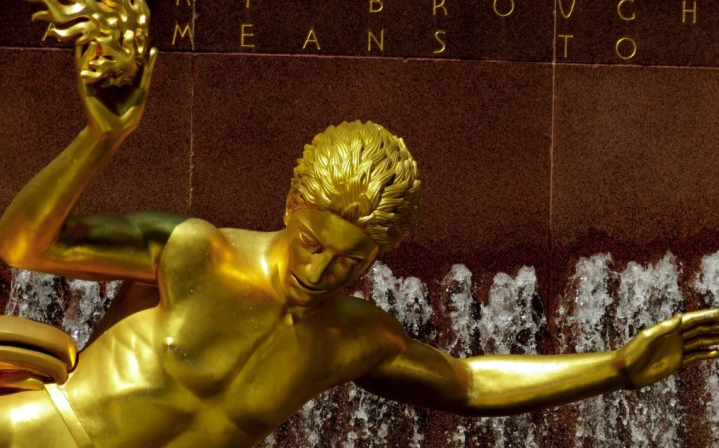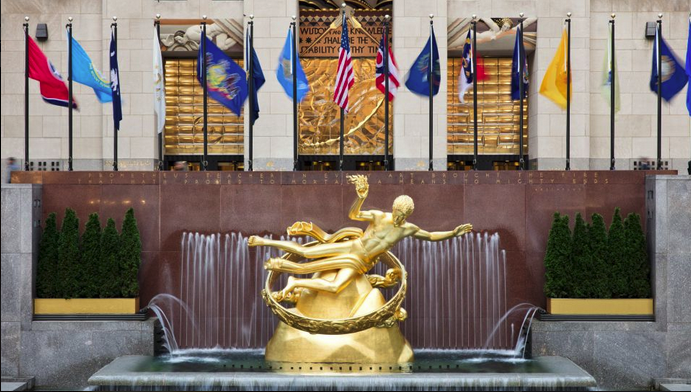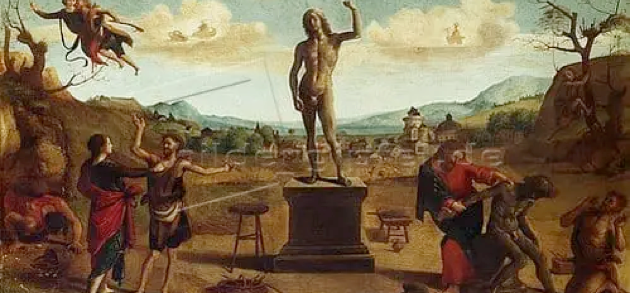Prometeo, colui che pensa prima degli altri
Prometeo (in greco antico Προμηθεύς, Promethéus, “colui che riflette prima”), è una figura della mitologia greca, titano, figlio di Giapeto e di Climene. A questo eroe amico del genere umano sono legati alcuni antichissimi miti che ebbero fortuna e diffusione in Grecia. Egli è anche “cugino” di Zeus, essendo anche quest’ultimo figlio di un titano, Crono. Le tradizioni differiscono talvolta sul nome della madre. Viene citata Asia, figlia di Oceano o Climene, anch’ella un’ Oceanina. Una leggenda più antica lo rendeva figlio di un Gigante, chiamato Eurimedonte, il quale lo aveva generato violentando Era, il che spiegherebbe l’avversione di Zeus verso Prometeo. Prometeo ha vari fratelli: Epimeteo, che è, in contrasto con lui, il “maldestro” per eccellenza, Atlante, Menezio. Prometeo si sposò a sua volta. Il nome di sua moglie varia egualmente secondo gli autori: il più delle volte è Celeno, o anche Climene. I suoi figli sono Deucalione, Lico e Chimereo, ai quali si aggiungono talvolta Etneo, Elleno e Tebe. La sua azione, posta ai primordi dell’umanità, si esplicava in antitesi a Zeus, dando origine alla condizione esistenziale umana.
Prometeo is a figure from Greek mythology, a titan, son of Iapetus and Clymene. This hero as a friend of mankind is tied some ancient myths that had luck and spread in Greece. He is also a “cousin” of Zeus, the latter also being the son of a Titan, Cronus. Traditions sometimes differ on the name of the mother. Asia is cited, daughter of Ocean or Clymene, she too an Oceanid. A legend made him the oldest son of a Giant, called Eurymedon, and he was generated after the raping of Era, which would explain the aversion of Zeus to Prometheus. Prometheus had several brothers Epimetheus, which is, in contrast to him, the “awkward” for excellence, Atlas, Menoetius. Prometheus married in turn. The name of his wife also varies according to the authors: most of the time is Celaeno, or Clymene. His children are Deucalion, Lico and Chimereo, to which are sometimes added Etneo, Hellen and Thebes. His action is set at the beginning of mankind, and was shown in the antithesis of Zeus, giving rise to the existential human condition.
Prometeo aveva 5 coppie di fratelli gemelli. All’inizio i fratelli erano virtuosi e saggi, ma si lasciarono prendere dall’avidità e allora gli dei mandarono una tempesta che distrusse il loro paese. Atlante e Menezio, sopravvissero al diluvio, si unirono a Crono e ad altri Titani per combattere gli dei. Zeus, però, uccise Menezio con un fulmine e condannò Atlante a portare il Cielo sulle spalle per sempre. Prometeo si schierò dalla parte di Zeus, dicendo di fare altrettanto al fratello Epimeteo; inoltre partecipò alla lotta solo quando oramai volgeva al termine. Come premio aveva ricevuto di poter accedere liberamente all’Olimpo. Infatti fu presente alla nascita di Atena dalla testa di Zeus, che fu molto gentile e buona con lui. Zeus, per la stima che riponeva in Prometeo, gli diede l’incarico di forgiare l’uomo che modellò dal fango e che animò con il fuoco divino. Dell’amicizia che provava per gli uomini Prometeo diede testimonianza fin dalla prima volta che se ne dovette occupare: quando ricevette da Atena e dagli altri dei un numero limitato di “buone qualità”, suo fratello Epimeteo, senza pensarci tanto, cominciò a distribuirle agli animali. Prometeo rimediò subito rubando ad Atena uno scrigno in cui erano riposte l’intelligenza e la memoria e le donò agli umani. Zeus in quel momento aveva deciso di distruggerli: non approvava la gentilezza di Prometeo per le sue creature e considerava i doni del titano troppo pericolosi, perché gli uomini in questo modo sarebbero diventati sempre più potenti e capaci. A quell’epoca, gli uomini erano ammessi alla presenza degli dei, con i quali trascorrevano momenti conviviali di grande allegria e serenità. Durante una di queste riunioni tenuta a Mekone (o Mecone), fu portato un enorme bue, del quale metà doveva spettare a Zeus e metà agli uomini. Il signore degli dei affidò l’incarico della spartizione a Prometeo che approfittò dell’occasione per vendicarsi del re degli dei. Difatti ammazzò l’animale, lo tagliò a pezzi e ne fece due parti. Agli uomini riservò i pezzi di carne migliori, nascondendoli però sotto la disgustosa pelle del ventre del toro. Agli dei riservò le ossa che mise in un lucido strato di grasso. Fatte le porzioni, invitò Zeus a scegliere la sua parte, il resto andava agli uomini. Zeus accettò l’invito e prese la parte grassa, ma vedendo le ossa abilmente nascoste, si arrabbiò lanciando una maledizione sugli uomini. Fu da allora che gli uomini sacrificando agli dei lasciarono a essi le parti immangiabili delle bestie sacrificate, consumandone la carne; ma i mangiatori di carne diverranno per questo mortali mentre gli dei rimarranno immortali. Lo sfrontato raggiro doveva essere punito e Zeus, senza colpire Prometeo, tolse il fuoco agli uomini e lo nascose.

Prometheus had five pairs of twin brothers. At first, the brothers were virtuous and wise, but they were overcome by greed and so the gods sent a storm that destroyed their country. Atlas and Menezio, who survived the flood, joined Cronus and other Titans to fight the gods. Zeus, however, killed Menetius with a thunderbolt and condemned Atlas to carry Heaven on his shoulders forever. Prometheus sided with Zeus, telling his brother Epimetheus to do the same; moreover, he took part in the fight only when it was drawing to a close. As a reward, he received free access to Olympus. In fact, he was present at the birth of Athena from the head of Zeus, who was very kind and good to him. Zeus, because of his esteem for Prometheus, gave him the task of forging the man he fashioned from mud and animated with divine fire. Of the friendship he felt for men, Prometheus bore witness from the very first time he had to deal with them: when he received a limited number of ‘good qualities’ from Athena and the other gods, his brother Epimetheus, without much thought, began to distribute them to the animals. Prometheus immediately remedied this by stealing from Athena a chest containing intelligence and memory and giving them to humans. Zeus at that moment had decided to destroy them: he did not approve of Prometheus’ kindness to his creatures and considered the titan’s gifts too dangerous because humans would become more and more powerful and capable in this way. At that time, men were admitted into the presence of the gods, with whom they spent convivial moments of great joy and serenity. During one of these gatherings held at Mekone (or Mecone), an enormous ox was brought, half of which was to be given to Zeus and half to men. The lord of the gods entrusted the task of division to Prometheus, who took the opportunity to take revenge on the king of the gods. In fact, he killed the animal, cut it into pieces and made two parts of it. For men, he reserved the best pieces of meat but hid them under the disgusting skin of the bull’s belly. For the gods he reserved the bones, which he placed in a shiny layer of fat. Having made the portions, he invited Zeus to choose his share, the rest going to the men. Zeus accepted the invitation and took the fat part, but seeing the bones cleverly hidden, he became angry and put a curse on the men. It was from then on, that men sacrificed to the gods and left to them the inedible parts of the sacrificed beasts, consuming their flesh; but the flesh-eaters became mortal for this while the gods remained immortal. The shameless deception had to be punished and Zeus, without striking Prometheus, took the fire away from men and hid it.
Prometeo si recò da Atena affinché lo facesse entrare di notte nell’Olimpo e appena giunto, accese una torcia dal carro di Elio e si dileguò senza che nessuno lo vedesse. Secondo altre leggende, egli ritrovò la torcia nella Fucina di Efesto, ne rubò qualche favilla e, incurante delle conseguenze, la riportò agli uomini. Venutolo a sapere, Zeus promise di fargliela pagare. Così ordinò ad Efesto di costruire una donna bellissima, di nome Pandora, la prima del genere umano, alla quale gli dei del vento infusero lo spirito vitale e tutte le dee dell’Olimpo la dotarono di doni meravigliosi. Si racconta che Zeus la inviò da Epimeteo affinché punisse la razza umana, alla quale Prometeo aveva dato il fuoco divino. Epimeteo, avvertito dal fratello di non accettare regali da Zeus, la rifiutò; cosicché Zeus, più indignato che mai per l’affronto subìto prima dall’uno poi dall’altro fratello, decise di punire ferocemente il Titano e tutti gli uomini che egli difendeva. Il padre degli dei fece incatenare Prometeo, nudo, nella zona più alta e più esposta alle intemperie e gli venne conficcata una colonna nel corpo. Inviò poi un’aquila perché gli squarciasse il petto e gli dilaniasse il fegato, che gli ricresceva durante la notte, giurando di non staccare mai Prometeo dalla roccia.
Prometheus went to Athena to enter Olympus by night, and as soon as he arrived, he lit a torch from Helium’s chariot and vanished without anyone seeing him. According to other legends, he found the torch in Hephaestus’ Forge, stole a few sparks from it and, heedless of the consequences, brought it back to mankind. On learning of this, Zeus promised to make him pay. So he ordered Hephaestus to build a beautiful woman, named Pandora, the first of mankind, to whom the wind gods infused the spirit of life and all the goddesses of Olympus endowed her with marvellous gifts. It is said that Zeus sent her to Epimetheus to punish the human race, to whom Prometheus had given divine fire. Epimetheus, warned by his brother not to accept gifts from Zeus, refused it; so that Zeus, more indignant than ever at the insult suffered first by one and then by the other brother, decided to punish the Titan and all the men he defended fiercely. The father of the gods had Prometheus chained, naked, in the highest and most exposed area to the elements, and a pillar was driven into his body. He then sent an eagle to rip open his chest and tear out his liver, which grew back during the night, swearing never to detach Prometheus from the rock.

Epimeteo, dispiaciuto per la sorte del fratello, si rassegnò a sposare Pandora, ma essa sventatamente e per pura curiosità aprì un vaso che Epimeteo teneva gelosamente custodito, nel quale Prometeo aveva chiuso tutti i mali che potessero tormentare l’uomo: la fatica, la malattia, la vecchiaia, la pazzia, la passione e la morte. Essi uscirono e immediatamente si sparsero tra gli uomini; solo la speranza, rimasta nel vaso tardivamente richiuso, da quel giorno sostenne gli uomini anche nei momenti di maggior scoraggiamento. Come narrato nella tragedia perduta di Eschilo Prometeo liberato, dopo tremila anni, Eracle passò dalla regione del Caucaso, trafisse con una freccia l’aquila che tormentava Prometeo e lo liberò spezzando le catene.
Epimetheus, sorry for his brother’s fate, resigned himself to marry Pandora, but she unwittingly and out of sheer curiosity opened a jar that Epimetheus jealously guarded, in which Prometheus had closed all the evils that could torment man: fatigue, sickness, old age, madness, passion and death. They came forth and immediately scattered among men; only hope, which remained in the belatedly closed vessel, sustained men from that day forward even in the moments of greatest discouragement. As narrated in Aeschylus’ lost tragedy Prometheus Delivered, after three thousand years, Heracles passed through the Caucasus region, pierced the eagle tormenting Prometheus with an arrow and freed him by breaking his chains.
Secondo il racconto contenuto nella Biblioteca dello Pseudo-Apollodoro, durante un incontro tra Chirone ed Eracle, alcuni centauri attaccarono l’eroe. Questi per difendersi usò le frecce bagnate con il veleno dell’Idra, da cui non si poteva guarire. Chirone venne inavvertitamente graffiato da una delle frecce. Non potendo morire perché immortale, cominciò per lui una sofferenza atroce. Zeus quindi accettò la vita di Chirone che poté finalmente morire in cambio dell’immortalità di Prometeo.
According to the story in the Library of Pseudo-Apollodorus, during a fight between Chiron and Heracles, some centaurs attacked the hero. To defend himself, the latter used arrows doused with the Hydra’s poison, from which he could not recover. Chiron was inadvertently scratched by one of the arrows. Unable to die because he was immortal, excruciating suffering began for him. Zeus then accepted the life of Chiron, who could finally die in exchange for the immortality of Prometheus.


